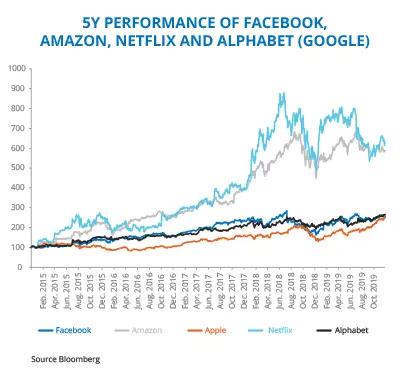No need to introduce the FANGs[1] to anyone. You are probably one of the billions of people that use Google Maps©, Instagram©, Netflix© or Amazon© on a daily – or minutely? – basis. Or you may have invested in one of these companies. Without any exception, these have been top investments over the last years, mostly driven by high revenue growth and the prospects of attractive profitability.

The impact of most of these companies on society and on our daily lives has been enormous during the last decade. With them, we feel closer and connected to whomever we want. Just sitting in our chair, we can order almost everything from all over the globe at very competitive prices.
More connection, less privacy
This small device called smartphone has become our window to the world. While this evolution is generally perceived as an enrichment of our quality of life (some would say “comfort consumerism”), one cannot be blind for a number of unwanted side-effects, the lack of privacy being the most important one. You may be sure that searching on the internet for a Christmas holiday destination will be followed by an avalanche of targeted publicity related to potential Christmas holiday destinations on all your internet connected devices. Probably not exactly what you deliberately wanted…
On a much larger scale, there is the well-documented Facebook-Cambridge Analytica case. Back in 2018, Cambridge Analytica had harvested the personal data of millions of Facebook users without their consent and used it for political advertising purposes. Obviously, companies such as Alphabet and Facebook are coming under pressure and a vivid debate on the collection and use of personal data arose. Regulators all over the world started scrutinizing companies that were collecting private data and using them without explicit consent.
Europe was at the forefront in adequately reacting on this privacy issue. GDPR (General Data Protection Regulation) is a regulation in the EU law on data protection and privacy for all individual citizens of the European Union and the European Economic Area. Organizations that are not compliant with this regulation can now face heavy fines.
Enough to jeopardize the hegemony and competitiveness of our mega-quartet in 2020? We don’t think so.
Data self-abuse?
First, even with the scandals on data privacy, people don’t seem like they want to change their habits. Let’s face it: how many of us are aware of their Google or Facebook profile and explicitly change it to keep their own data private? Most of the time, we will simply click on “accept”, without even knowing in detail what we are accepting.
Second, whilst we absolutely agree that individuals must have the complete discretion on if and how their data are used and whilst we absolutely think that this should be regulated and controlled by government instances, we don’t believe that many of FANGs’ users would tolerate the consequences of completely barring access to their private data.
If we can use Google maps or Instagram for free, that’s because of the online advertising that is supporting these apps. This online advertising is mostly based on what these apps know about their users. If users do not let these apps collect and use (part of) their data, they will soon be charged for this. Not sure everyone is ready to pay for such apps, or to renounce the services offered by the use of the data: for example, Amazon proposing its users books that will highly likely please them, based on their history and on history of other customers that have a comparable profile. The same goes for Netflix, Youtube©, Pinterest©…
Questionable practices
Apart from the regulation on privacy and the use of data, most of the internet giants are also under fire because of competitive practices.
Facebook©’s competitive practices are under investigation by the U.S. Congress, Department of Justice, FTC and 47 state attorneys general. Google is under antitrust investigation by the Justice Department, the House of Representatives Judiciary Committee and dozens of state attorneys general. Google and Facebook are facing EU antitrust probes as well.
These investigations are very complex and will probably take a lot of time. Internet giants will defend themselves by stating that competition is very intense, and is intensifying at an accelerating pace, and the reason why. Between them of course, but not only.
Let’s take the example of Google search, which is the most used search engine on the Web: 54% of product searches searches (which admittedly are only a minor part of the total search market), are now done on Amazon. The other way around: customers can buy goods directly from their Instagram (Facebook) account or directly from YouTube (Google). Both Amazon, Facebook and Google are offering competing payment facilities.
The bigger threat may come from overseas. In speech technology, autonomous driving, e-commerce and payment systems, Chinese internet giants such as Tencent©, Alibaba© or Baidu© have closed the technological gap already, having made tremendous progress in AI and ML. They are now starting to compete with the western internet moguls on their own home turf... and without the same constraints on the use of private data, a mismatch which may finally result in a major competitive disadvantage against China.
Regulators will continue to scrutinize FANG companies, and as far as it concerns the protection and correct use of private data, this seems appropriate and the FANGs are able to adapt their behavior – Alphabet devoting 20% of its huge resources to R&D – without too much implications for the long term future of their business models.
When it comes to the investigations on competitive practices, the regulator could decide to levy heavy fines or to force companies to split up in different business divisions. This would definitely impact the long term prospects of the targeted companies, but given the complex nature of these investigations, 2020 should not face significant disruption.
----
[1] The acronym for Facebook, Amazon, Netflix, Google.

